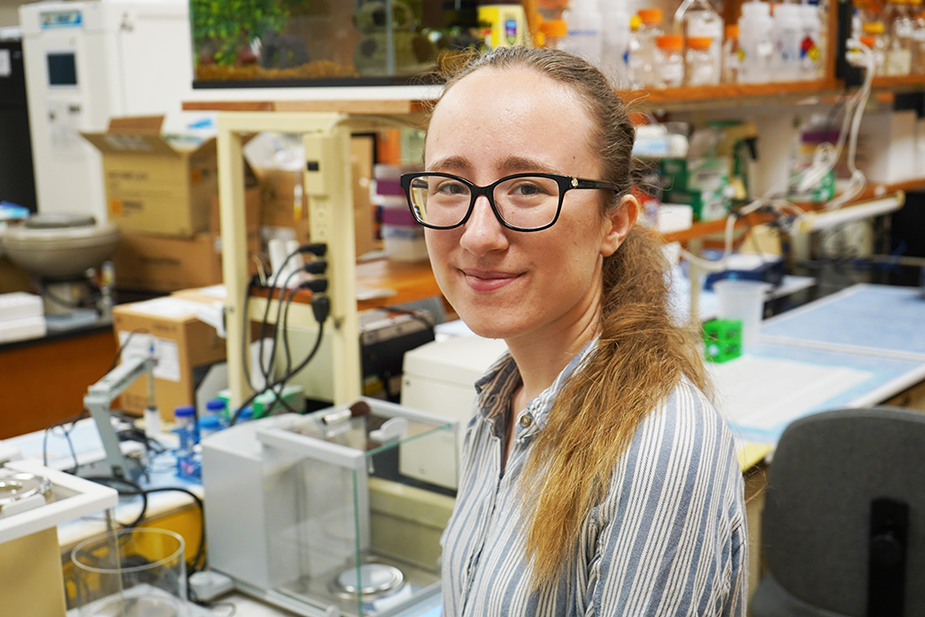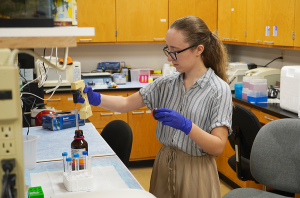
Camryn Habben is convinced that the high school version of herself would be in disbelief about how passionate the college version of herself is regarding research.
While Habben has always enjoyed science, research wasn’t something she expected to connect with in such a strong way. She has worked in the laboratory of Rocío Rivera, a professor in the Division of Animal Sciences, for nearly two years, focusing on a project related to epigenetics, which is the study of how behaviors and environment can cause changes that affect the way genes work. Habben is building on her research portfolio this summer, too, after being named a Cherng Summer Scholar.
“I was definitely the kid in high school who didn’t like working with the chemicals and had to wear gloves for every small task,” said Habben, a biological sciences major at the University of Missouri who will be a senior this fall. “I honestly wasn’t a fan. Now that I’m part of a lab, I can’t imagine doing anything else. I am a bit shocked by it all, but I’m also incredibly thankful for the opportunities that research has brought me.”
A full-time, nine-week summer research or creative scholarship program for Honors College students, the Cherng Summer Scholars program is supported by a gift from Peggy and Andrew Cherng and the Panda Charitable Foundation. Recipients receive a $7,000 award and access to a $1,000 project expense account.
“I was very honored to be chosen as a Cherng Summer Scholar,” Habben said. “Research can be a bit isolating at times. There are days where you focus on one specific task and don’t have the opportunity to interact with others. You do talk about your project with your labmates every so often, but this program has given me the opportunity to branch out and learn about what my peers are passionate about. It has been really fun to hear about research that is quite a bit different than mine.”

It was in a genetics course that Habben first heard about epigenetics. The more she learned, the more she thought it would be a nice starting point for her research story.
“It felt like a good place for me to jump in, and I’m glad I did,” Habben said. “I have loved the work I’m doing.”
Habben, who is from Blue Springs, Missouri, said she was a bit behind with certain lab skills when she first started, but her understanding of the concepts related to epigenetics helped close that gap. She added that it was helpful to have such a supportive faculty member backing her as she began her work.
“I’m very lucky to have Dr. Rivera in my corner,” Habben said. “She gave me a chance when I didn’t have a ton of research experience. I appreciated that she was very up front with me and let me know that things aren’t always going to go the way I want them to – and sometimes they won’t work at all. Her advice has helped me feel much more comfortable.”
Habben’s project was born out of a colleague’s discovery and question. A neighbor laboratory found a difference in the expression of a specific gene in beef cattle, LGALS14, which is a protein coding gene.
“We were asked if this gene may be imprinted, an epigenetic mechanism, and if there was some misregulation in that region that was causing the issue,” Habben said. “We learned that it is not imprinted – but there was enough data in our research to suggest that there were some other epigenetic mechanisms that could explain the difference in gene expression.”
Habben said that the Rivera lab did find some polymorphisms (DNA base differences) on the DNA methylation sites in the promoter region that they were looking at. DNA methylation is a biological process in which methyl groups are added to the DNA molecule. Methylation can change the activity of a DNA segment without changing the sequence. When DNA methylation is located in a gene promoter, it typically acts to repress gene transcription.
Habben’s summer research is centered on what they found in the promoter region. She is also waiting on results from sequencing she performed on cattle conceptus, or embryos.
“We had a past project in the laboratory related to CCCTC-binding factor, or CTCF, which identified CTCF binding sites in the bovine genome,” Habben said. “We’re studying if the surrounding CTCF sites might affect the expression of LGALS14. CTCF is a factor that affects how chromatin loops. DNA methylation has been found to disrupt that looping, and that’s important because its segments chromatin into these regions. If that communication is disrupted, it can cause issues with more than one gene interaction.”
Habben has no plans to slow her laboratory work. She is hoping to build on the research she is doing by pursuing a PhD after earning her biological sciences degree from Mizzou.
“I’ve learned so much during my time in the lab,” Habben said. “My problem-solving skills have grown tremendously, and it’s been such a fun ride. I love studying epigenetics, and I look forward to continuing to explore that passion.”